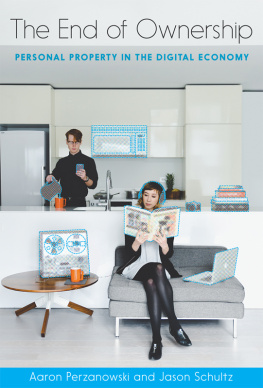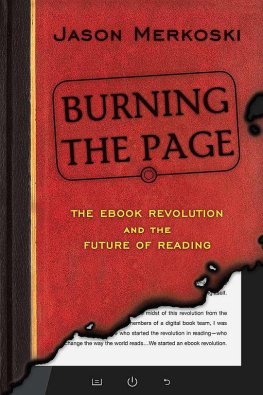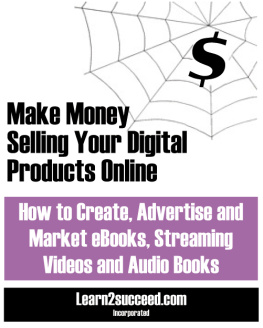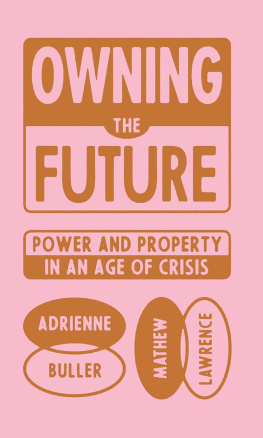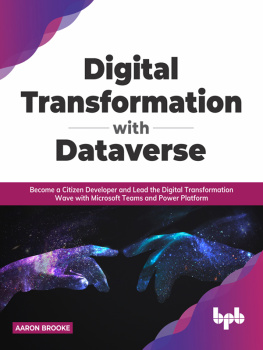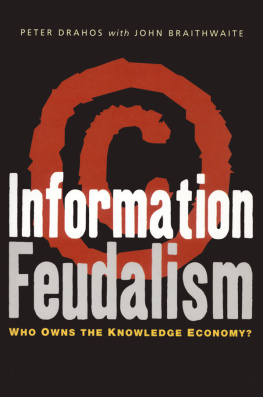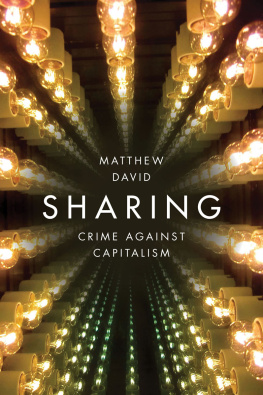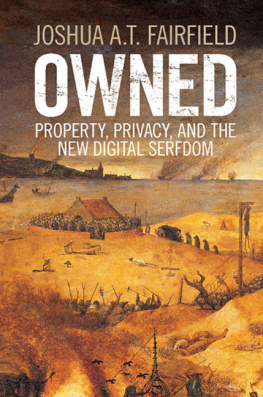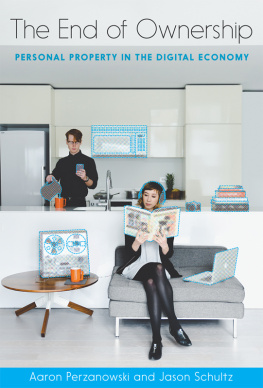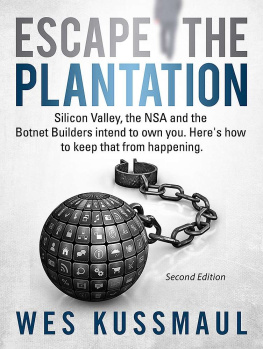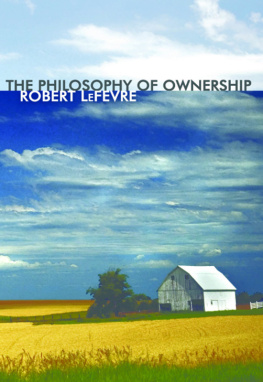The Information Society Series
Laura DeNardis and Michael Zimmer, series editors
Interfaces on Trial 2.0, Jonathan Band and Masanobu Katoh
Opening Standards: The Global Politics of Interoperability, Laura DeNardis, editor
The Reputation Society: How Online Opinions Are Reshaping the Offline World, Hassan Masum and Mark Tovey, editors
The Digital Rights Movement: The Role of Technology in Subverting Digital Copyright, Hector Postigo
Technologies of Choice? ICTs, Development, and the Capabilities Approach, Dorothea Kleine
Pirate Politics: The New Information Policy Contests, Patrick Burkart
After Access: The Mobile Internet and Inclusion in the Developing World, Jonathan Donner
The World Made Meme: Public Conversations and Participatory Media, Ryan Milner
The End of Ownership: Personal Property in the Digital Economy, Aaron Perzanowski and Jason Schultz
The End of Ownership
Personal Property in the Digital Economy
Aaron Perzanowski and Jason Schultz
The MIT Press
Cambridge, Massachusetts
London, England
2016 Massachusetts Institute of Technology
All rights reserved. No part of this book may be reproduced in any form by any electronic or mechanical means (including photocopying, recording, or information storage and retrieval) without permission in writing from the publisher.
This book was set in Stone Sans and Stone Serif by Toppan Best-set Premedia Limited. Printed and bound in the United States of America.
Library of Congress Cataloging-in-Publication Data
Names: Perzanowski, Aaron, author. | Schultz, Jason M., author.
Title: The end of ownership : personal property in the digital economy /
Aaron Perzanowski and Jason Schultz.
Description: Cambridge, MA : The MIT Press, 2016. | Series: The information
society series | Includes bibliographical references and index.
Identifiers: LCCN 2016013180 | ISBN 9780262035019 (hardcover : alk. paper)
eISBN 9780262335942
Subjects: LCSH: Personal property. | InternetLaw and legislation. |
Electronic commerceLaw and legislation. | Intellectual property.
Classification: LCC K783 .P47 2016 | DDC 346.04/8dc23 LC record available at http://lccn.loc.gov/2016013180
ePub Version 1.0
For Clem, who at least gets my record collectionAP
For Kate & Elliott, my two favorite booksneaksJS
Acknowledgments
This project grew out of a series of our academic articles: Digital Exhaustion, UCLA Law Review 58 (2011): 889946; Copyright Exhaustion and the Personal Use Dilemma, Minnesota Law Review 96 (2012): 20672143; Legislating Digital Exhaustion, Berkeley Technology Law Journal 28 (2015): 15351557; and Reconciling Personal and Intellectual Property, Notre Dame Law Review 90 (2015): 12131263. It also draws from What We Buy When We Buy Now, by Aaron Perzanowski and Chris Jay Hoofnagle, forthcoming in the University of Pennsylvania Law Review (2016). We thank those journals, their editors, and our many colleagues who helped refine our thinking at those early stages. Wed also like to extend our appreciation to the long list of law schools where those articles and portions of this book were workshopped.
We are grateful to Peter Steffensen for outstanding research assistance and to Yawen Li for last-minute editing. For their thoughtful comments on this manuscript, wed like to thank Brandon Butler, Ryan Calo, Rochelle Dreyfuss, Dave Fagundes, Josh Fairfield, Toms Gmez-Arostegui, James Grimmelmann, Parker Higgins, Chris Hoofnagle, Peter Jaszi, Ariel Katz, Mark Lemley, Lydia Loren, Mike Madison, Christina Mulligan, Sean OConnor, John Rothchild, Sarah Schindler, Matthew Schruers, Sherwin Siy, Molly Shaffer Van Houweling, and Fred von Lohmann.
Introduction
Chances are, you are reading this book in one of two ways. Either you are holding a bound set of printed pagesa traditional analog bookor you are holding an electronic device displaying a digital filean ebook. Whether the page is physical or virtual, the words are the same. But the seemingly simple choice between these two ways of delivering text offers a window into a broader set of questions about the emerging digital economy and our place within it. In the courts, in the marketplace, and in our homes, we find mounting evidence that our rights to own, control, repair, and use the products we buy depend, in large part, on whether those goods are analog or digital. This looming rift between buyers of analog and digital goods is the byproduct of a number of relatively recent legal, technological, and marketplace developments. And those shifts implicate not only media content like books, music, and movies, but also nearly every software-enabled device we encounter, from phones, cars, and coffeemakers to medical devices like pacemakers and insulin pumps.
An example may help illustrate the problem. In George Orwells dystopian classic 1984, the Ministry of Truth, at the behest of Big Brother, destroyed documents by casting them into the memory hole, a massive network of tubes leading to an incinerator. Amazon, the worlds largest bookseller, sells 1984along with millions of other titlesboth in print and in its Kindle ebook store. Assuming they had a chance to read the book first, Kindle users were no doubt struck by the irony of Amazons decision to remotely delete their purchased copies of 1984 in response to a dispute with a publisher. These customers went to bed one night thinking they owned a copy of Orwells cautionary tale and woke up the next morning to find their book had been confiscated. In its place, they received a refund and an object lesson in the risks of digital reading.
In the world of printed books, this scenario would be unthinkable. Your local bookseller cannot creep into your home in the middle of the night and reclaim the contents of your bookshelf. But Amazon exercises a very different kind of practical power over your digital library. Your Kindle runs software written by Amazon, and it features a persistent network connection. That means Amazon can send it instructionsto delete a book or even replace it with a new versionwithout any intervention from you.
But its not just the technology that sets analog and digital books apart. The legal terrain looks very different as well. If you bought a printed copy of this book, it became your personal property. Like your favorite pair of shoes, or your toothbrush, you own it. Ownership of this book means you can do lots of things with it. You can keep it forever; you can read it as many times as you like; you can lend it to a friend; you can resell it or give it away; you can leave it to a loved one in your will. We dont encourage it, but you can even burn it if you feel like it. Because of the demands of copyright law, you generally cannot make copies of this book without permission. But otherwise, if you own it, it is yours to do with as you choose. This may seem obvious; the same basic rules of personal property have applied to books and other movable property for hundreds of years.
And you might expect digital books to work much the same as their printed counterparts. They contain the same text and are often sold by the very same retailers for comparable prices. Indeed, a 2012 study showed that nearly a third of bestselling ebooks were more expensive than their hardcover counterparts. But according to publishers and retailers, ebooks play by a distinct sets of rules. For print, we rely on the familiar rules of personal property. But do you actually own your ebooks? Most readers have probably never paused to ask this question. After all, you clicked the Buy Now button and paid the price demanded by your favorite ebook retailer. Why wouldnt you own the thing you bought?
Next page
